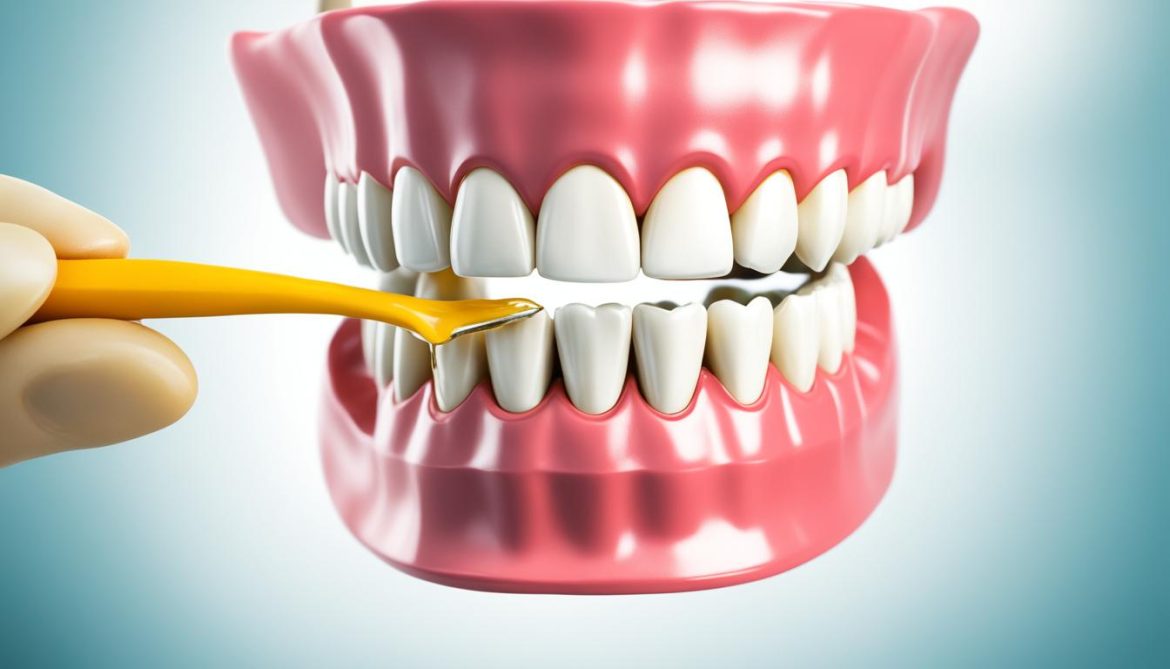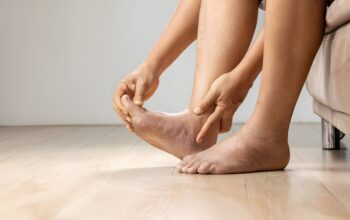Whitening strips are a popular and effective way to achieve a brighter smile. However, many people wonder if they can brush their teeth immediately after using whitening strips. According to dental experts, it is generally safe to brush your teeth after using whitening strips. Brushing helps to remove any leftover gel or residue from the strips and maintain overall oral hygiene. It is important to use a soft-bristled toothbrush and a gentle brushing technique to avoid any potential sensitivity or damage to the enamel.
Key Takeaways:
- It is generally safe to brush your teeth after using whitening strips.
- Use a soft-bristled toothbrush and a gentle brushing technique to avoid sensitivity or enamel damage.
- Maintaining good oral hygiene is crucial after using whitening strips.
- Brush your teeth twice a day with fluoride toothpaste and a soft-bristled toothbrush.
- Floss daily and use mouthwash to promote overall dental health.
The Importance of Oral Hygiene After Whitening
Maintaining good oral hygiene is crucial after using whitening strips to ensure the longevity of results and promote overall dental health. After achieving a brighter smile, it’s important to continue prioritizing oral care to maintain the desired outcome. By following a few simple practices, you can optimize the benefits of whitening and keep your smile looking its best.
The Basics of Oral Hygiene
Brushing your teeth twice a day with fluoride toothpaste and a soft-bristled toothbrush is the foundation of oral hygiene. This helps remove plaque and prevent tartar buildup, enhancing the effectiveness of whitening strips. Remember to use gentle circular motions and pay equal attention to all surfaces of your teeth.
In addition to brushing, flossing daily is essential to remove food particles and plaque from between the teeth and along the gumline. This step ensures a comprehensive clean and reduces the risk of gum disease and tooth decay.
Using mouthwash as part of your oral hygiene routine can be beneficial as well. Mouthwash can help kill bacteria, freshen breath, and give an extra boost to your oral health. Opt for an alcohol-free mouthwash with fluoride to maintain the health of your teeth and gums.
Dental Care Tips After Whitening
When it comes to oral care after whitening, consistency is key. Follow these dental care tips to maintain your bright smile:
- Continue brushing your teeth twice a day with fluoride toothpaste and a soft-bristled toothbrush.
- Floss daily to remove any residual plaque or particles.
- Use mouthwash regularly to keep your breath fresh and maintain oral health.
- Avoid consuming staining substances such as coffee, tea, and red wine, especially immediately after whitening.
- Visit your dentist for regular check-ups and professional cleanings to keep your oral health in optimal condition.
By following these dental care practices, you can not only preserve the results of your teeth whitening but also promote excellent overall oral hygiene. Remember, maintaining good oral hygiene is a lifelong commitment that pays off in the form of a healthy and beautiful smile.
The Effectiveness of Whitening Strips
Whitening strips have become a popular choice for individuals seeking a brighter smile. These over-the-counter products contain a bleaching agent, typically hydrogen peroxide, which targets surface stains and lightens the color of your teeth. By using whitening strips, you can effectively improve the appearance of stained or discolored teeth.
However, it is important to note that the effectiveness of whitening strips can vary depending on the individual and the severity of the stains. While some people may achieve significant results, others may experience more subtle changes. Consistency and adherence to the instructions provided with the whitening strips are key to maximizing their effectiveness.
To ensure optimal results, it is advisable to consult with a dentist before using whitening strips. A dental professional can assess your dental health, provide personalized advice, and recommend the most suitable teeth whitening options based on your individual needs.
Benefits of Whitening Strips
Using whitening strips offers several benefits, including:
- Convenience: Whitening strips can be easily used at home, allowing you to incorporate teeth whitening into your daily routine.
- Affordability: Compared to professional teeth whitening treatments, whitening strips are a more budget-friendly option.
- Non-invasiveness: Whitening strips are non-invasive and do not require any special equipment or tools.
While whitening strips can effectively enhance the appearance of your teeth, it’s important to manage your expectations and understand that they may not provide the same level of results as professional teeth whitening treatments. If you are looking for more dramatic or customized results, it may be worth considering a professional treatment.
Check out the image below to see the before and after results of using whitening strips:
| Before Whitening Strips | After Whitening Strips |
|---|---|
| Stained and discolored teeth | Brighter and whiter smile |
| Surface stains | Reduced discoloration |
| Uneven tooth color | More uniform tooth shade |
As you can see from the table above, using whitening strips can lead to noticeable improvements in the color and appearance of your teeth. However, it’s important to remember that individual results may vary.
“Whitening strips have been a game-changer for me. They have significantly brightened my smile and boosted my confidence. I love how easy and convenient they are to use.” – Sarah, satisfied user of whitening strips
It’s crucial to maintain good oral hygiene practices while using whitening strips. Brush your teeth at least twice a day with a soft-bristled toothbrush, floss regularly, and use mouthwash to ensure optimal oral health. Consulting with a dentist before and during your whitening journey can help you achieve the best possible results and address any concerns or questions you may have.
Potential Side Effects of Whitening Strips
While whitening strips can effectively whiten teeth, it is important to be aware of their potential side effects. Understanding these side effects can help you make an informed decision and ensure a safe teeth whitening experience.
1. Tooth Sensitivity
One common side effect of whitening strips is tooth sensitivity. The bleaching agent in the strips, usually hydrogen peroxide, can temporarily make the teeth more sensitive to hot and cold temperatures. You may experience discomfort or pain when consuming hot or cold foods and beverages. This sensitivity is usually mild and goes away after the whitening treatment is completed.
2. Gum Irritation
Another possible side effect is gum irritation. If the whitening strips come into contact with the gum tissue, it can cause redness, swelling, or soreness. It is important to follow the instructions provided with the strips to ensure they are properly applied and do not touch the gums. If you experience gum irritation, it is advisable to discontinue the use of the strips and consult with a dentist.
Sensitivity and gum irritation are typically temporary and subside once the whitening treatment is finished. However, it is important to note that individual experiences may vary. If the side effects persist or worsen, it is recommended to seek professional dental advice.
To minimize the risk of these side effects, it is essential to use the whitening strips as directed and avoid overusing them. Follow the instructions and do not exceed the recommended usage time or frequency. Additionally, using a toothpaste formulated for sensitive teeth before and after the whitening treatment can help alleviate discomfort and protect your teeth.
If you have a history of tooth sensitivity or gum problems, it is advisable to consult with a dentist before using whitening strips. They can evaluate your dental health and provide personalized advice to ensure a safe and effective teeth whitening experience.
| Side Effects of Whitening Strips | Description |
|---|---|
| Tooth Sensitivity | The bleaching agent can temporarily increase tooth sensitivity to hot and cold temperatures. |
| Gum Irritation | Improper application or contact of whitening strips with gums may cause redness, swelling, or soreness. |
Best Practices for Using Whitening Strips
To ensure the best possible results and minimize the risk of side effects, it is important to follow some best practices when using whitening strips. Here are some dental advice and tips:
- Read and Follow Instructions: Start by carefully reading and following the instructions provided with the whitening strips. Each product may have specific usage guidelines and recommended treatment durations.
- Avoid Overuse: Do not overuse the whitening strips or leave them on for longer than recommended. Excessive use can lead to tooth sensitivity and irritation.
- Avoid Staining Substances: During the whitening treatment, it is advisable to avoid consuming staining substances such as coffee, tea, and tobacco. These can interfere with the whitening process and diminish the effectiveness of the strips.
- Maintain Oral Hygiene: Brush and floss your teeth regularly to maintain proper oral hygiene. This helps remove surface stains and enhances the whitening effects of the strips.
Achieve the best results with whitening strips by reading and following the instructions, avoiding overuse and staining substances, and maintaining proper oral hygiene.
Remember, everyone’s dental needs and sensitivities may vary. It is always a good idea to consult with a dentist for personalized dental advice and guidance on using whitening strips.
Comparison of Whitening Strips Instructions
| Brand | Usage Instructions |
|---|---|
| Brand A | Apply strips for 30 minutes daily for 14 days. |
| Brand B | Apply strips for 1 hour daily for 7 days. |
| Brand C | Apply strips for 20 minutes twice a day for 10 days. |
Each brand may have different instructions for optimal results. Always refer to the specific product guidelines for accurate usage instructions.
Post-Whitening Care Tips
After using whitening strips to achieve a brighter smile, it’s important to follow some post-whitening care tips to maintain the results and promote optimal oral health. By incorporating these tips into your routine, you can enjoy a healthy and vibrant smile for longer.
Avoid Staining Substances
To preserve the whiteness of your teeth, avoid consuming staining substances for at least 48 hours after whitening. This includes beverages such as coffee, tea, and red wine, which can diminish the effects of whitening. Opt for lighter-colored foods and drinks during this time to minimize the risk of discoloration.
Steer Clear of Smoking
Smoking not only poses numerous health risks, but it can also lead to tooth staining. If you’re committed to maintaining the results of your teeth whitening treatment, it’s best to avoid smoking altogether. Not only will this benefit your oral health, but it will also contribute to your overall well-being.
Practice Regular Brushing and Flossing
Consistent oral hygiene practices are key to maintaining your whitened smile. Brush your teeth at least twice a day using a soft-bristled toothbrush and fluoride toothpaste. Floss daily to remove plaque and debris from between your teeth and along the gumline. This routine will help prevent stains and keep your gums healthy.
Visit Your Dentist
Regular dental check-ups and professional cleanings are crucial to maintaining excellent oral health. Your dentist can assess the condition of your teeth, provide personalized advice, and address any concerns you may have. Schedule routine visits to ensure that your oral hygiene remains in top shape.
By following these post-whitening care tips, you can extend the longevity of your whitening results and keep your smile looking its best. Remember to prioritize your oral hygiene and consult with your dentist for personalized advice on maintaining your dental health.

Professional Teeth Whitening vs. Whitening Strips
While teeth whitening strips offer a convenient and cost-effective way to brighten your smile, it’s important to understand that they may not deliver the same level of results as professional teeth whitening treatments. Professional treatments, such as in-office bleaching or take-home kits prescribed by a dentist, often utilize higher concentrations of the bleaching agent, which can lead to more significant whitening results.
Here, let’s compare the two options to help you make an informed decision:
| Factors | Whitening Strips | Professional Teeth Whitening |
|---|---|---|
| Effectiveness | Varies depending on the individual and severity of stains; may provide noticeable improvements | Utilizes higher concentrations of the bleaching agent for potentially more dramatic results |
| Convenience | Easy to use at home, no need for dental appointments | May require multiple visits to the dentist and longer treatment duration |
| Cost | Generally more affordable compared to professional treatments | Typically higher cost due to professional expertise and use of specialized equipment |
| Customization | One-size-fits-all strips may not provide a tailored whitening experience | Dentist can customize the treatment based on individual needs and dental health |
Please note that individual results may vary, and it’s important to consult with a dentist to determine the most suitable teeth whitening method for your specific needs.
Professional teeth whitening treatments can provide exceptional results, particularly for individuals with severe stains or those seeking quicker and more dramatic changes. The higher concentrations of the bleaching agent used in professional treatments allow for greater control and customization, ensuring a brighter smile that meets your expectations.
However, it’s worth considering that professional teeth whitening may require multiple visits to the dentist and come with a higher price tag. On the other hand, whitening strips offer a more convenient and budget-friendly option, although the results may be more gradual and less dramatic.
Ultimately, the choice between whitening strips and professional teeth whitening depends on your personal preferences, budget, and the level of whitening you desire. It’s best to consult with a dentist who can assess your dental health, discuss your goals, and guide you towards the most suitable teeth whitening option.
Maintaining Overall Oral Hygiene
In addition to using whitening strips, maintaining overall oral hygiene is essential for healthy teeth and gums. By following a consistent oral care routine, you can prevent cavities, remove plaque, and promote fresh breath.
Here are some key practices to incorporate into your dental care:
- Brush your teeth at least twice a day: Brushing your teeth helps remove plaque and prevent cavities. Use a soft-bristled toothbrush and fluoride toothpaste to gently clean your teeth and gums.
- Floss daily: Flossing removes plaque and food particles from between your teeth and along the gumline. It helps prevent gum disease and reduces the risk of tooth decay.
- Use mouthwash: Using mouthwash can help kill bacteria and freshen your breath. Choose an antiseptic mouthwash that is alcohol-free for optimal oral hygiene.
- Visit your dentist regularly: Schedule regular dental check-ups and cleanings to maintain optimal oral health. Your dentist can detect any dental issues early on and provide professional teeth cleaning to remove stubborn plaque and tartar.
- Adopt a balanced diet: Eating a nutritious diet plays a vital role in oral health. Limit sugary and acidic foods and beverages, which can erode tooth enamel. Opt for foods that promote dental health, such as fruits, vegetables, and dairy products.
By following these dental care practices and maintaining regular visits to your dentist, you can ensure that your oral hygiene remains in great condition, enhancing the effectiveness of whitening strips and promoting a bright and healthy smile.
Addressing Individual Dental Concerns
When considering teeth whitening methods, it is important to take into account individual dental concerns or conditions that may affect the use of whitening strips or other treatments. Consulting with a dentist is crucial to address specific dental issues before embarking on a whitening journey. Whether it’s tooth sensitivity, gum disease, or tooth decay, a dentist can provide personalized advice and recommend the most suitable teeth whitening options based on individual needs and dental health.
When it comes to dental care, a one-size-fits-all approach may not be effective for everyone. The condition of your teeth and gums, as well as any existing dental problems, can greatly impact the suitability and effectiveness of teeth whitening methods such as whitening strips. That’s why it’s essential to seek professional dental advice before proceeding with any whitening treatment.
For example, if you have sensitive teeth, using whitening strips may cause discomfort or increased sensitivity. A dentist can evaluate the underlying cause of your tooth sensitivity and recommend alternative teeth whitening options or suggest ways to minimize sensitivity before using whitening strips. Additionally, individuals with gum disease or tooth decay may need to address these issues before proceeding with any teeth whitening treatment.
| Dental Concerns | Possible Solutions |
|---|---|
| Tooth Sensitivity | Desensitizing toothpaste, professional treatments |
| Gum Disease | Treatment of gum disease, professional cleanings |
| Tooth Decay | Treatment of cavities, restoration of decayed teeth |
Disclaimer: The table above provides general information and possible solutions for common dental concerns. Each individual’s dental condition is unique, and it is important to consult with a dentist for personalized advice and treatment options.
By addressing any existing dental concerns before using whitening strips, individuals can ensure a safer and more effective teeth whitening experience. A dentist will have a comprehensive understanding of your dental health and can guide you toward the most suitable teeth whitening options that prioritize both aesthetics and oral health.
Remember, dental advice and personalized treatment recommendations play a vital role in achieving the best possible results while maintaining good oral hygiene. With the guidance of a dentist, you can confidently navigate your dental journey and make informed decisions about teeth whitening that align with your individual dental needs.
When to Seek Professional Dental Advice
While whitening strips can be a convenient option for teeth whitening, there may be instances where professional dental advice is necessary. If you experience severe tooth sensitivity or gum irritation after using whitening strips, it is recommended to consult with a dentist. Additionally, if you have underlying dental or oral health issues, such as cavities or gum disease, it is advisable to seek professional dental advice before using whitening strips. A dentist can assess your dental health and provide appropriate guidance and treatment.
Remember, your dental health is important, and seeking professional dental advice when needed is crucial. Whether it’s for teeth whitening or addressing any other dental concerns, a dentist can provide personalized recommendations based on your individual needs. Don’t hesitate to schedule an appointment with a dental professional if you have any questions or issues related to your dental care.
Conclusion
Whitening strips offer an effective solution for achieving a brighter smile. After using whitening strips, it is important to brush your teeth to remove any residual gel and maintain oral hygiene. By following proper dental care practices and seeking personalized advice from a dentist, you can ensure the best results and maintain optimal dental health.
Remember, oral hygiene plays a crucial role in the effectiveness of teeth whitening. Brushing your teeth at least twice a day, flossing daily, and using mouthwash are essential habits to prevent plaque buildup and maintain a healthy smile.
If you have any individual dental concerns or conditions, it is important to consult with a dentist before using whitening strips or any other teeth whitening method. A dentist can provide personalized advice based on your specific needs and address any underlying dental issues.
For a brighter smile and long-term oral health, continue practicing good dental care, seek professional advice when needed, and enjoy the confidence that comes with a healthy, beautiful smile.







